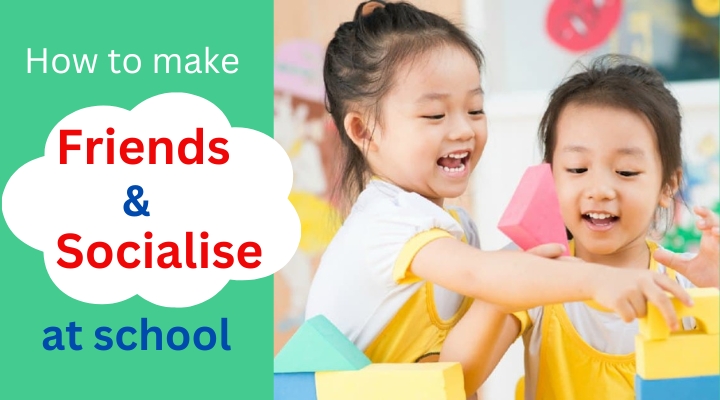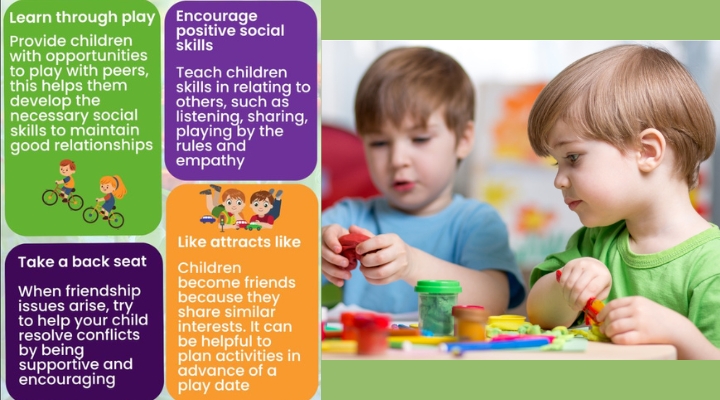How to Make Friends & Socialise at School
As the school bell rings and students flood the hallways, the prospect of making friends and socializing can be both exciting and nerve-wracking. In this article, we will explore How to Make Friends & Socialise at School various strategies and approaches to help you navigate the world of school socialization with confidence and authenticity. Whether you’re starting a new school year, transferring to a different institution, or just looking to expand your social circle, the ability to connect with others is an essential skill that goes beyond the classroom. Making friends isn’t just about finding people to talk to during lunch breaks; it’s about building meaningful relationships that can last a lifetime.
How to Make Friends & Socialise at School
1. Introducing Yourself-
The simplest step in making friends is often the most overlooked: introducing yourself. When you’re in a new class or situation, take the initiative to introduce yourself to those around you. A brief introduction can lead to further conversations and lay the foundation for future interactions.
Related- How To Handle Typical Phobias And Anxiety In Children
2. Becoming an Active Listener-
Engaging in conversations involves not only talking but also actively listening. Show genuine interest in what others are saying, ask follow-up questions, and respond thoughtfully. Active listening demonstrates that you value the person’s perspective and encourages them to reciprocate by showing interest in your thoughts and experiences.
3. Approach Someone Sitting Alone at Lunch-
One of the most daunting aspects of school socialization is approaching someone who is sitting alone. However, this can also be one of the most rewarding experiences. By reaching out to someone who appears isolated, you not only show kindness but also open the door to new friendships. Remember that many people feel just as nervous about approaching others, so your friendly gesture might be a welcome relief.
4. Lend a Hand-
Acts of kindness can be powerful icebreakers. If you notice someone struggling with a heavy backpack or juggling books, offer to help. This small gesture can lead to conversations and opportunities to get to know each other better. Kindness not only makes others feel appreciated but also creates an environment where people are more likely to open up and connect.
You can also check- How To Ensure Safety Of Newborn Kids- Childproofing The House!
5. Meet New People Through Friendship Apps-
In today’s digital age, making friends isn’t confined to the physical world. There are various friendship apps designed to connect individuals with shared interests. These apps can be particularly helpful if you’re shy or find it challenging to initiate conversations in person. Just remember to stay safe online and ensure that you’re using reputable platforms.
6. Sign Up for an Improv Class-
Joining an improv class can be a fantastic way to boost your socializing skills. Improv encourages you to think on your feet, be spontaneous, and collaborate with others. These classes create a supportive environment where everyone is working together to create something fun and engaging. Not only will you develop your communication skills, but you’ll also gain confidence in interacting with different personalities.
7. Make Eye Contact and Smile-
It might sound simple, but making eye contact and smiling can have a profound impact on your social interactions. When you make eye contact, you show that you’re engaged and interested in the conversation. A genuine smile can make you appear approachable and friendly, which can attract others to strike up conversations with you.
8. Break the Ice with Humor-
Humor is a universal icebreaker. Sharing a funny anecdote or a light-hearted joke can instantly lighten the atmosphere and create a positive impression. However, it’s important to be sensitive to others’ preferences and avoid offensive humor.
Also check- How To Deal With Toddler Tantrums And Behavior Issues
9. Offer a Compliment-
Compliments are like little rays of positivity that can brighten someone’s day. If you genuinely like someone’s outfit, hairstyle, or even their contributions in class, let them know! However, be sincere in your compliments; authenticity is key. A well-placed compliment can initiate a conversation and create a connection based on shared interests.
10. Find Common Interests-
Shared interests provide a solid foundation for building friendships. Whether you’re passionate about sports, art, music, or a particular subject, seeking out individuals who share your interests can lead to meaningful connections. Joining clubs, teams, or extracurricular activities related to your passions can be a great way to meet like-minded peers.
11. Show Kindness and Respect-
Treat everyone with kindness and respect, regardless of their background or interests. Being inclusive and avoiding cliques helps create a welcoming environment that encourages meaningful friendships to flourish.
12. Being Yourself-
Authenticity is magnetic. Trying to be someone you’re not to fit in can create superficial connections that ultimately fizzle out. Instead, embrace your true self and let your personality shine. Genuine connections are built on shared values and authentic interactions.
Check for- How To Build A Strong Parent-Child Bond
13. Recognize Your Friendly Qualities-
It’s easy to underestimate your qualities when it comes to making friends. Take a moment to recognize your friendly traits. Are you a good listener? Do you have a great sense of humor? Are you compassionate and understanding? Embrace these qualities and let them shine in your interactions. People are often drawn to individuals who radiate positivity and warmth.
Remember, making friends is a gradual process that requires patience and effort. Not every interaction will lead to a deep friendship, and that’s perfectly okay. The goal is to create connections that are meaningful and fulfilling for both parties involved. As you embark on your journey to make friends and socialize at school, keep in mind that authenticity and kindness will always be your greatest assets. So, step out of your comfort zone, reach out to others, and watch as your social circle blossoms.
Frequently Asked Questions-
How do I overcome shyness and approach new people to make friends?
Overcoming shyness is a common challenge, but it’s not insurmountable. Start by setting small goals, like introducing yourself to one new person each day. Practice positive self-talk to boost your confidence and remind yourself of your strengths. Engage in activities or join clubs that align with your interests; this provides an organic way to meet like-minded individuals. Remember that everyone has moments of shyness, and most people appreciate genuine efforts to connect.
What if I feel like I don’t fit in with any particular group?
Feeling like you don’t fit in can be discouraging, but remember that school is a diverse environment with numerous personalities and interests. Instead of focusing solely on fitting into a pre-existing group, consider branching out and connecting with individuals who share your niche interests or values. Quality friendships can be formed with people who appreciate your uniqueness. Seek out clubs, events, or activities where you can meet people who share your passions.
How do I maintain a balance between making new friends and keeping up with schoolwork?
Balancing socializing with schoolwork can be challenging, but it’s essential for overall well-being. Time management is key. Prioritize your studies and create a schedule that allows you to allocate specific times for both academic and social interactions. Also, seek study groups or collaborative projects that allow you to socialize while learning. Remember, maintaining a balanced life contributes to better academic performance and healthier friendships.
What do I do if I experience rejection while trying to make friends?
Rejection is a natural part of social interactions, but it shouldn’t deter you from making new connections. It’s important to realize that rejection is often not about you; it could be due to someone else’s circumstances or preferences. If you experience rejection, don’t take it to heart. Focus on the positive interactions you’ve had and the potential friendships that are still out there. Resilience is key; don’t let one negative experience discourage you from seeking meaningful connections.
How can I transition from online interactions to real-life friendships?
Online interactions can be a great starting point for friendships, but transitioning to real-life connections requires a thoughtful approach. If you’ve been chatting with someone online, suggest meeting up at school events or activities that interest both of you. Taking that step from virtual to real interactions can solidify your connection. Remember to always prioritize your safety and meet in public spaces. Keep the tone of your online interactions friendly and positive to make the transition smoother.










